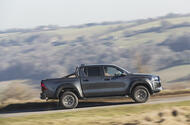HMRC makes U-turn on changes to benefit-in-kind rules after criticism from motor industry
One week on from proposed new company car taxes for double-cab pick-up trucks HMRC has scrapped the plans.
Company car scheme users who bought or leased a double-cab pick-up truck were due to see the benefit in kind (BIK) payments sky rocket under proposals announced on 12 February, but in a dramatic U-turn after criticism from farmers and the motor industry it has reversed its decision.
HRMC had announced that they would no longer consider double-cab pick-up trucks as commercial vehicles, as their second row of seats allowed them to have a dual function as a personal vehicle.
The change to company car tax BIK for double-cab pick-up trucks was due to be implemented on all new purchases or leases from 1 July 2024, and would have meant owners no longer paid a flat rate of BIK for all commercial vehicles and instead be taxed using the emissions-based system used for passenger cars.
Double-cab pick-up owners would therefore likely have been lumbered with the highest 37% rate of BIK due to the high CO2 emissions of most pick-up trucks.
In a statement, HMRC said “its existing guidance will be withdrawn†and that double-cab pick-ups would “continue to be treated as goods vehicles rather than carsâ€. As a result, “businesses and individuals can continue to benefit from its historic tax treatmentâ€.
The initial decision was due to a ruling in the Court of Appeal that stated multi-purpose vehicles like pick-up trucks are passenger cars, after HMRC won a case against Coca-Cola over the classification of five-seat vans.
The repercussions of that ruling had meant that the tax “loophole†allowing pick-up trucks to be classed as commercial vehicles was cast into doubt, threatening the high volume of sales for pick-up trucks in the UK.
Despite the change of heart, however, it will only affect double-cab pick-ups with a payload of more than one tonne. Double-cab pick-ups with payloads below 1000kg, like the Ford Ranger Raptor, will continue to be classed as passenger cars.

